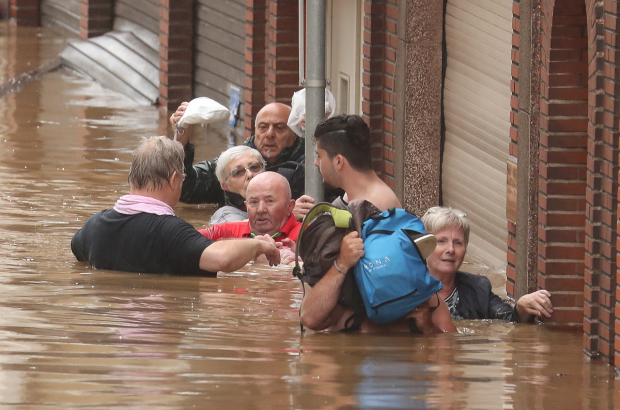- Daily & Weekly newsletters
- Buy & download The Bulletin
- Comment on our articles
Climate crisis means more flooding, says geographer, as Liege residents evacuated
The natural disaster occurring in the south and east of Belgium at present – rivers of water flowing through town centres and residential areas, resulting in at least six deaths and tens of thousands of evacuations – is the result of the climate crisis, according to KU Leuven geographer Nicole van Lipzig.
The amount of rain falling in Luxembourg, Namur, Liege and Limburg provinces this week – as well as western Germany – is due to an occluded front, van Lipzig told De Standaard. This is when a cold front catches up to a warm front, and together they push moisture upwards, which eventually falls back to earth as rain.
Occluded fronts can move across the atmosphere, but the one causing all the trouble is stationary, meaning that rather than moving across – and hence raining on – all of Belgium, it is releasing all that precipitation in a finite area. “Warmer air retains more moisture,” explains van Lipzig. “A hundred years ago, a similar weather front would not have produced so much rain.”
The increasing temperatures seen in Belgium over the last few years mean more occlusions fronts such as this are inevitable. She also points to the unprecedented heat waves seen in the US this year. “Only a reduction in greenhouse gas emissions can prevent this situation from deteriorating further.”
Residents angry at local leaders
Barring that, residents in the affected regions are asking politicians to take measures to keep flood waters from rushing through the streets, businesses and homes. According to one resident in Voeren, politicians claimed they would do something to better protect property after the last flood in 2018, but “forgot all about it two days later. Nothing has happened. We need a plan.”
The city council in Voeren did indeed promise to deepen and widen parts of the Berwinne, a tributary of the Meuse river that flows through Liege and Limburg provinces. The works on the Berwinne were postponed and are now due to be carried out next year. A VRT correspondent pointed out, however, that even if those works had been completed, it would not have been enough to prevent much of the flooding seen this week.
Federal government takes over
In the meantime, the federal government has announced a national emergency and have taken over the emergency response in the affected areas. Residents of Liege who live near the Meuse are now being evacuated to higher ground as the river has begun to burst its banks. All shops and services in the centre of town were ordered to close at 15.00.
The rains are not expected to ease up in the affected provinces until the weekend, and the front has also moved into the centre and northern areas of Belgium. While these areas are not expected to see the same amount of rainfall, provincial and regional authorities are on alert.
The Red Cross has stepped in to assist emergency workers in Brussels. There has been little damage reported, though crews are trying to drain standing water in some tunnels.
Photo top: Residents in Liege struggle to leave their homes
©Bruno Fahy
















